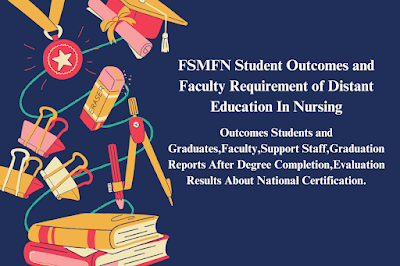The FSMFN Student Outcomes and Faculty Requirement of Distant Education In Nursing. Distance learning is instruction delivered synchronously or asynchronously using one or more technologies that support regular, content-related interaction.
The FSMFN Student Outcomes and Faculty Requirement of Distant Education In Nursing
Outcomes and Faculty Requirement of Distant Education In Nursing Frontier School of Midwifery and Family Nursing (FSMFN) offers an innovative distance education program that has evolved to meet the needs of nurses pursuing advanced practice degrees while staying in their home communities. The school’s focus is on providing flexible, high-quality education that prepares nurse midwives and nurse practitioners for national certification and professional practice.
Outcomes: Students and Graduates
- In 2003, FSMFN graduated its first class of MSN students: 17 students earned their Master of Science in Nursing (MSN) degree.
- There were 268 students enrolled in the school during 2003, with 227 in the Certified Nurse Midwifery Education Program (CNEP) and 41 in the Community-Based Family Nurse Practitioner (CFNP) track.
- A total of 120 students were enrolled in the MSN program, while nine students enrolled in the Women’s Health Nurse Practitioner (WHNP) completion option, and three students were enrolled in both the CNEP and CFNP tracks.
- The average age of FSMFN students was 39 years old. The student body consisted of 262 women and 6 men, representing every state in the U.S. and several minority groups, demonstrating FSMFN’s diverse student population.
Faculty at FSMFN
- FSMFN employs 32 teachers, administrators, and librarians, with 16 full-time and 16 part-time faculty members. The majority of part-time faculty serve as Regional Clinical Coordinators (RCCs), who provide advising and clinical site evaluations for students.
- All faculty members hold at least a master’s degree, and seven are doctorally prepared. Faculty are also certified in their areas of specialty, with some holding dual certifications as nurse midwives and family nurse practitioners.
- FSMFN has a strong focus on academic advancement, with several faculty members currently pursuing doctoral degrees.
Support Staff at FSMFN
FSMFN’s support staff are dedicated to providing essential services to students, ensuring smooth operations for both academic and clinical placement aspects. The support team includes:
- A registrar, a financial aid officer, and a quality assurance coordinator (QAC), who oversees clinical site placement and the establishment of contracts for student placements.
- A four-member multimedia team that develops courses, manages technology, and provides technical support to students, faculty, and staff.
Graduation Reports After Degree Completion
- In 2003, 53 students completed the CNEP, with 19 of them also receiving an MSN degree. Additionally, nine CNEP graduates completed the course work to obtain a WHNP certificate.
- Eight students completed the CFNP, and of those, five also received an MSN degree. One student completed both the CNEP and CFNP programs, demonstrating FSMFN’s flexibility for students pursuing multiple certifications.
Evaluation Results on National Certification
- Certification exam results provide important insight into the quality of FSMFN’s programs. In 2003, FSMFN’s CNEP graduates achieved a 92% first-time pass rate on the American College of Nurse-Midwives Certifying Corporation (ACC) exam, significantly higher than the national average of 76.2%.
- All graduates from the CFNP track passed their national certifying exam on their first attempt, showing the program’s success in preparing students for certification.
- According to a graduate survey conducted in January 2004, FSMFN graduates were employed in their respective specialties, with many serving underserved populations and running their own practices, highlighting the program’s impact on improving healthcare access in rural and underserved areas.
Continuing Education and Program Innovation
FSMFN continues to develop and refine its distance education programs for nurse midwives and nurse practitioners. By transitioning from certificate programs to an online MSN program, FSMFN provides a flexible, high-quality educational experience that meets the professional and personal needs of its students. The school’s commitment to institutional effectiveness, faculty development, and innovative teaching methods has resulted in a successful program that delivers excellent outcomes for both students and graduates.
FSMFN has positioned itself as a leader in distance nursing education, ensuring that nurses can advance their careers while maintaining their commitments to their communities and families. Through its integrated distance learning model and support for students’ success, FSMFN continues to excel in producing highly qualified nurse practitioners and nurse midwives who make a significant impact in healthcare.
FSMFN Student Outcomes and Faculty Requirement of Distant Education In Nursing
FSMFN Student Outcomes and Faculty Requirement of Distant Education In Nursing
FSMFN Student Outcomes and Faculty Requirement of Distant Education In Nursing
FSMFN Student Outcomes and Faculty Requirement of Distant Education In Nursing
FSMFN Student Outcomes and Faculty Requirement of Distant Education In Nursing
FSMFN Student Outcomes and Faculty Requirement of Distant Education In Nursing
FSMFN Student Outcomes and Faculty Requirement of Distant Education In Nursing
Read More:
https://nurseseducator.com/didactic-and-dialectic-teaching-rationale-for-team-based-learning/
https://nurseseducator.com/high-fidelity-simulation-use-in-nursing-education/
First NCLEX Exam Center In Pakistan From Lahore (Mall of Lahore) to the Global Nursing
Categories of Journals: W, X, Y and Z Category Journal In Nursing Education
AI in Healthcare Content Creation: A Double-Edged Sword and Scary
Social Links:
https://www.facebook.com/nurseseducator/
https://www.instagram.com/nurseseducator/
